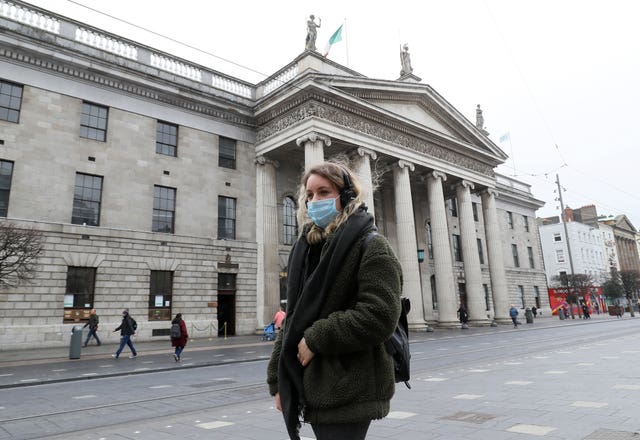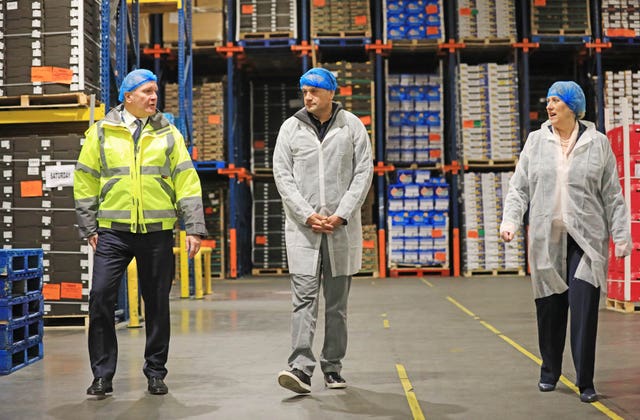
Ireland’s intensive care units will be at capacity “in a number of days”, Taoiseach Leo Varadkar has said.
Chief medical officer Tony Holohan and Mr Varadkar recently expressed concern over the number of patients diagnosed with Covid-19 admitted to ICU.
Mr Varadkar said that while there are currently a number of empty beds, the situation would change over the coming days, adding that it would become “very difficult”.
His warning came as three further deaths were confirmed in the state, bringing the death toll to 22.
The latest victims were described as a person in the north west of the country and two females in the east.
There were 302 new confirmed cases of Covid-19 announced on Friday evening, taking the total in Ireland to 2,121.

On Friday night, President Michael D Higgins signed into a law a sweeping package of emergency legislation to deal with the crisis.
Earlier, Mr Varadkar warned: “The way things are heading indicate that ICU will be at capacity in a number of days.
“That’s already the case around Europe, it may happen here. We have to plan for that.
“We need to make sure we have capacity, ventilators, all of those things.
“An unprecedented effort is being made by the health service to tool up, to recruit, to provide additional capacity, to do all the things we need to use.
“Just as we are seeing across Europe, just as we are seeing in the US now, just as we saw in China, there isn’t a health service in the world that isn’t going to be able to tool up or scale up as quickly as necessary, so we are going to be demanding a very difficult situation and everyone is going to be doing the very best job.”
Mr Varadkar said that people seeking a three-month payment break on mortgages and loans should not be forced to pay additional interest.
Mr Varadkar also said that people who can pay mortgages and loans during the coronavirus crisis should continue to do so.
Speaking in Dublin on Friday, he said: “I’ve a very simple message to the banks, and that is that if people cannot pay their mortgage and cannot repay their loans, then they should extend their loans by three months, give people a three-month break and add to the end of that loan the three extra months.
“That’s the right thing to do, that’s the fair thing to do, and it actually makes sense for the banks to do that in the longer term.
“That shouldn’t involve additional interest.
“When it comes to people who can pay their mortgages, who can pay their rents, and pay utilities, who can pay their loans, they should continue to do so because actually most people in Ireland who had a job haven’t lost it so they’re still getting paid.”
The Taoiseach was visiting fruit and vegetable wholesaler Total Produce in Swords where he and Minister for Business Heather Humphreys were given a tour.

Mr Varadkar said the total death toll from coronavirus was “impossible to predict”.
He added: “We are only still learning about it. But if you take the average flu season in Ireland, there would usually be around 500 deaths, if you take a bad flu season in Ireland there would roughly be 1,000 deaths.
“It would be a surprise, and a very pleasant surprise, if the number of deaths at the end of this was less than 1,000.”
Mr Varadkar also said that construction sites that cannot implement social distancing should be shut down.
The Fine Gael leader said that “absolutely essential” construction work needs to continue, including healthcare facilities and pharmaceutical plants.
He added: “Even arguably housing for homeless people so that they are not in overcrowded accommodation, but it does need to be done by social distancing.
“That can never be done perfectly.
“It’s not being done perfectly in the supermarkets, it’s not being done perfectly in other places, but it needs to be done to an acceptable extent that people are protected and the risk of the transmission of the virus is minimised.”
President Higgins signed the Emergency Measures in the Public Interest (Covid-19) Bill 2020 after its passage through both houses of the Oireachtas parliament in Dublin.
It includes measures to provide income support for workers, prevent evictions and implement a rent freeze throughout the health crisis.
The President said the laws reflected a time of crisis.
The Seanad has passed the Emergency Measures in the Public Interest (Covid-19) Bill 2020 and has agreed a motion to send it to the President for early signature. #seeforyourself #Seanad #COVID19 pic.twitter.com/390SblHv86
— Houses of the Oireachtas (@OireachtasNews) March 27, 2020
“Extraordinary and difficult measures have been necessary as we try to stem the tide of increasing infection,” he said.
“The effects of those measures will become visible in the coming weeks.
“The legislation is emergency legislation for a time of crisis. It is appropriate that it has time limits and leaves our constitutional rights in place.
“These are difficult times, but our difficulties will come to an end. Let us make sure that, through the decisions and actions we take at present, we ensure the health and safety of each other, all of us together.”


Comments: Our rules
We want our comments to be a lively and valuable part of our community - a place where readers can debate and engage with the most important local issues. The ability to comment on our stories is a privilege, not a right, however, and that privilege may be withdrawn if it is abused or misused.
Please report any comments that break our rules.
Read the rules here